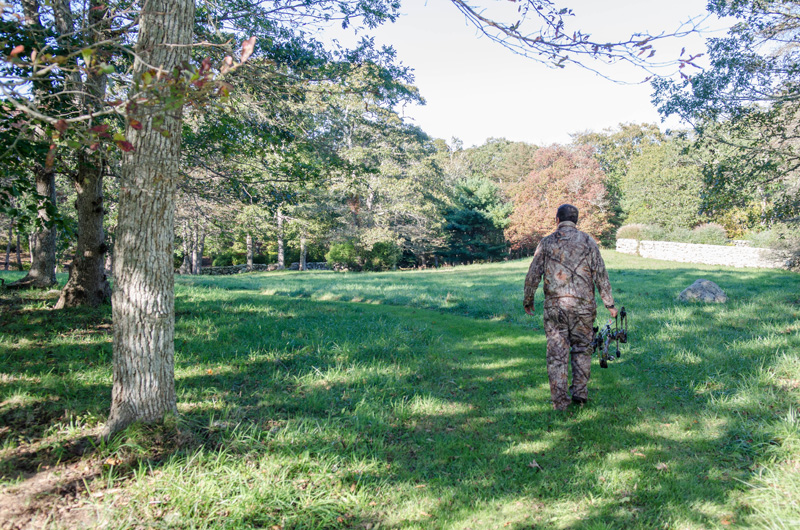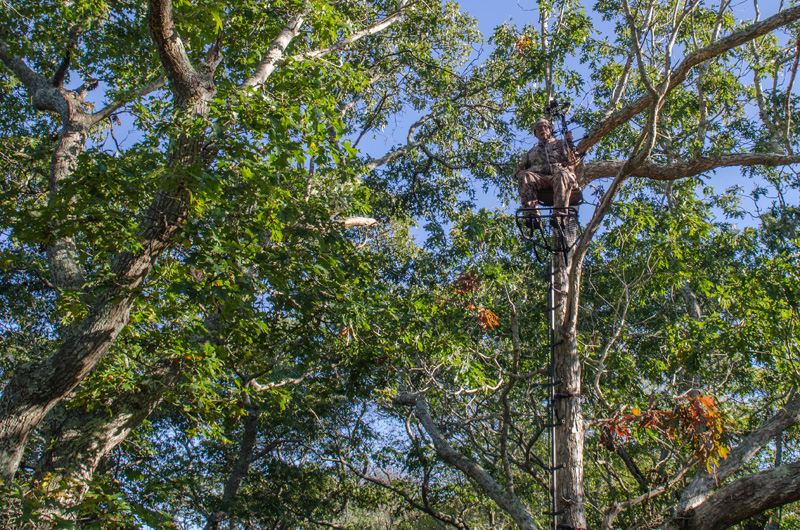Island boards of health and a nonprofit partner are rolling out a new program to help hunters donate and process venison on the Island, part of an initiative to reduce the deer herd and cases of tick-borne illness.
The new venison donation program, along with subsidized deer processing, is being coordinated by the Island Grown Initiative and the Martha’s Vineyard Tick Borne Illness Initiative by the six Island boards of health. Final details are still being ironed out, but parts of the program are set to be in place in time for shotgun hunting season, which begins Nov. 27.
The bow hunting season began Monday.
“We’re trying to do things that will encourage and allow hunters to take more deer,” said Richard Johnson, a field biologist working with initiative who has spearheaded the efforts. Mr. Johnson has been working for several years to study ticks and tick-borne illnesses on the Island, and he has pointed to the large deer population as a key part of that problem. Deer play an important part in the life cycle of ticks.
But on the Island, Mr. Johnson and others said hunters are often deterred from taking deer because they lack the time, equipment, or money to process deer or pay to have them butchered.

Starting this fall hunters will have more options, including donating deer at no cost through a program led by IGI. The program will take place during the shotgun season, executive director Rebecca Haag said this week.
Jefferson Munroe, a farmer who owns The Larder in Vineyard Haven, has agreed to make his facility available to process donated venison. Mr. Munroe will mix the venison with ground pork and package the meat into one or two-pound packages, Ms. Haag said. The venison will then be donated to the Island Food Pantry, which has freezers and refrigerators to store the meat. IGI plans to include recipes for venison tacos, stew and chili.
The Island program is modeled after a similar venison donation program on Nantucket.
For the first year, the meat will only be available at the food pantry, Ms. Haag said, though it could be expanded to other organizations depending on the success of the program.
The meat must be inspected by a certified inspector, Ms. Haag said, which has been a challenge to coordinate. She said IGI has also adhered to department of health requirements and worked with Island health agents.
A tentative plan is in place to allow hunters to easily donate the deer. IGI plans to put a truck at the deer check-in facility so hunters can place extra deer there.
Ms. Haag said the venison donation program is an extension of IGI’s work to create access to fresh, local food for people of all income levels. “In some ways it’s one of those two-fers,” she said. “We can reduce the deer population and potentially the tick population, and therefore disease. And at the same time we can help make a local food available on the Island . . . . we know people here struggle a little bit in the wintertime.”
Another part of the initiative includes partially subsidizing the cost for hunters who want to have deer processed for their own use. Mr. Johnson said the boards of health have the funding to work with an Islander who has freezers and a facility to cut up and package deer. Who will do the processing is still in the works. The usual fee is $150, Mr. Johnson said, but with a $50 subsidy hunters will pay $100.
The boards of health are working with the Permanent Endowment of Martha’s Vineyard, which is accepting donations and funding for the program for a small fee.
Mr. Johnson said that if the meat goes back to the hunter it does not have to approved by the FDA. Hunters can distribute the venison as they wish, he said. Deer must be taken legally and checked in at the check-in station.

“We’re bringing the costs down,” he said. “I hope the difference in price will help encourage them to take the deer and give them away.”
The group is also working to find people who could use the deer hides.
Mr. Johnson has long led initiatives to reduce the Island deer population, which is estimated at about 50 per square mile. On the mainland the population is estimated at 19 deer per square mile.
The new initiatives are big steps forward, and Mr. Johnson said he envisions one day opening a processing facility. “But we want to see how this works out first,” he said. “Neither of these things is going to get the number of deer to the level we need to reduce the population, but it’s part of it.”
Another boost came this year with a private donor who is paying for Mr. Johnson to work full-time through January. He had received a Martha’s Vineyard Vision Fellowship that paid for him to work one day a week but now his work can be expanded. “A lot more is getting done,” he said.
Edgartown health agent Matt Poole said additional funding is coming through that will allow the boards of health to support Mr. Johnson’s work. The fight against tick-borne illness is a priority, he said. “We don’t have a choice,” he said. “It’s a must do for us. If we don’t do this . . . Island residents and visitors are at risk.”
He called the new programs another step in the right direction. “It’s a broad effort,” Mr. Poole said. “We already believe and can see they’re making a difference.”
According to the state, 767 deer were killed on the Vineyard during the 2016 hunting season, about 160 more than in 2015 and above the five-year average of 658.
Island hunters said this week that cheaper deer processing or venison donation would be welcome additions.
“That’s a whole game changer,” said Chilmark resident Tim Rich, a shotgun and black powder hunter. “A lot of people would pay $100.” He said a program run in the past by the Wampanoag Tribe of Gay Head (Aquinnah) provided similar ways to donate deer.
“Having the access for hunters to be able to drop off deer and get it processed, or just drop it off . . . some hunters really enjoy the sport of it, and they get their fill so they stop,” he said. “Those are the people that would be continually harvesting more deer, because good hunters are good hunters.”
Brian Athearn, a West Tisbury bow hunter, said processing deer became so complicated and expensive that he and a group of friends built their own small facility for private use. “We did it out of necessity,” he said. “It’s not cheap and it’s not easy.”
He said he believes many hunters would take advantage of processing facilities. “There are some people that want to hunt and that’s the way they have an opportunity to do so,” he said. Plus, he said, venison is delicious. “I absolutely live on it,” he said. “My kids grew up on it.”
Other efforts are also continuing. Mr. Johnson has been working with landowners to allow hunting on privately-owned land. Last year about 50 additional acres of land were opened to hunting, he said, and this year it looks like 100 acres will be newly available to hunters.
“They are getting extra deer,” Mr. Johnson said.
This year the focus is on residential areas. “Most calls I’m getting are small properties,” he said. “For me that’s making a lot of sense . . . where most people encounter ticks is working in the yard.”
Residential areas also pose a wrinkle, he said, because hunters cannot hunt within 500 feet of a house in use.
Mr. Johnson reaches out to a well-known, carefully vetted group of hunters to hunt in those areas. Mr. Rich and Mr. Athearn both are part of the program.
At the end of last hunting season, Mr. Johnson made the rounds on the Island to propose extending the hunting season. After talking to hunters, that idea has been dropped for now. “As far as I’m concerned that’s off the table,” Mr. Johnson said.
State officials are still discussing possibly coming to the Island for a listening session this fall about other ideas, including starting the archery season earlier. Mr. Rich said he is in conversation with several property owners about hunting on their properties for the first time, which will help target deer that hide in protected areas. “You have to think outside the box,” he said.
Property owners interested in participating in the hunting program can email ticksmv@gmail.com.







Comments (8)
Comments
Comment policy »